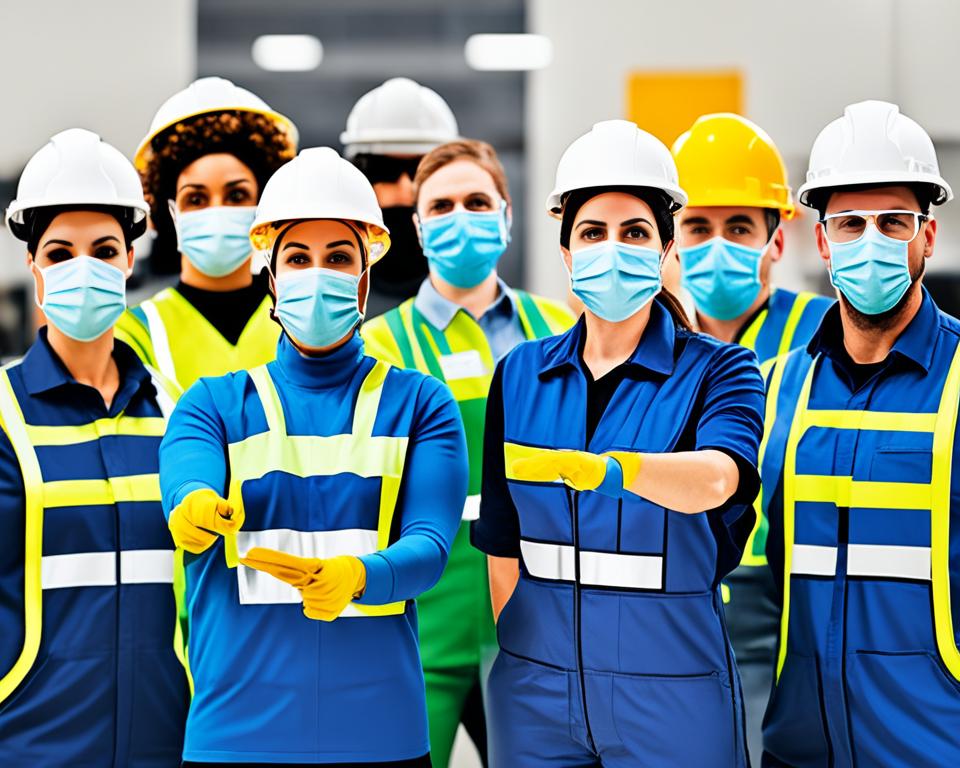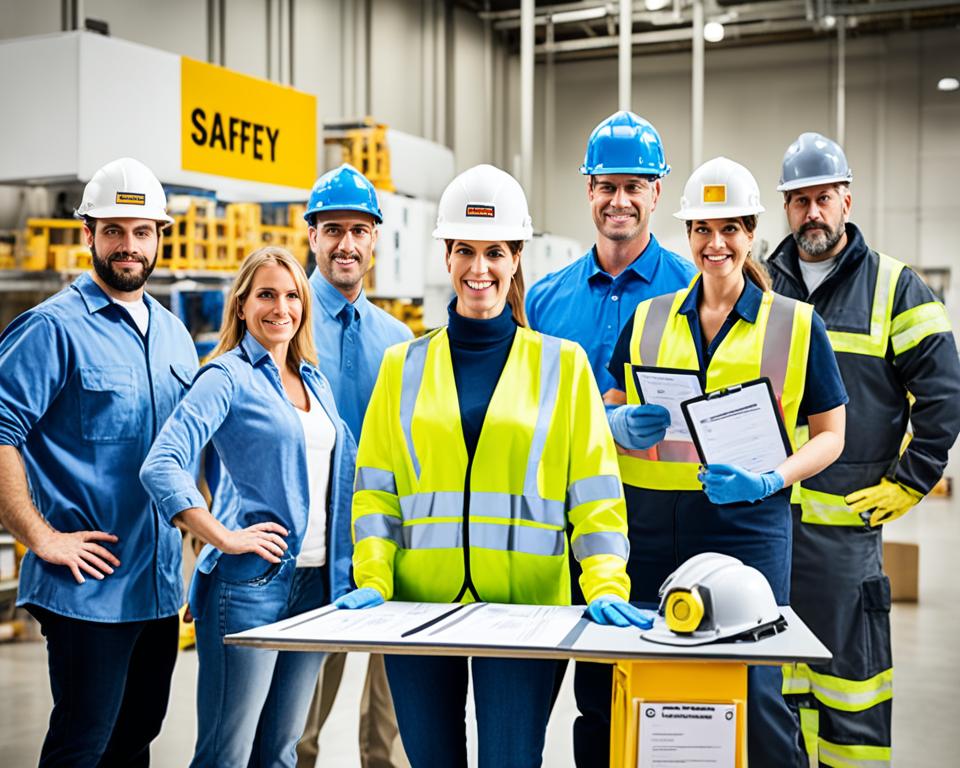
Who is Responsible for Buying PPE? When you work in a dangerous place, keeping workers safe is a top priority. Supervisors must pick the right personal protective equipment (PPE) for their team. This ensures everyone works safely and feels comfortable. But finding the best PPE can be tricky. Different jobs have different needs. Luckily, some key things help in choosing the right gear for any job. Tuff-N-Lite’s experts have highlighted seven must-have features in PPE. After reading this, you’ll know exactly what to look for in safety gear for your workers.
Who’s in charge of making sure workers have the right PPE though? Is it just the boss, the worker themselves, or a team effort? This question is key to keeping everyone safe at work. Its answer can change how both bosses and workers think about their safety. Let’s find out together who plays the biggest part in getting and using PPE for a safe workplace.
Table of Contents
ToggleKey Takeaways
- Employers are legally responsible for providing appropriate PPE to their workers in most places.
- The PPE needed changes by job, where you work, and the rules there.
- When picking PPE, bosses should think about the weather, dangers, and how to keep workers comfy while safe.
- PPE that fits well and is easy to see is really important at work.
- Thinking about the cost of PPE, both when buying it and later, is a big part of choosing the right gear.
Factors Influencing PPE Selection
Choosing the correct PPE for work safety is key. Key factors include climate, threat level, and balancing safety and comfort. These ensure workers stay safe and comfy on the job.
Climate
First, think about where the PPE will be worn. In hot places, heavy gear might tire workers. This can make accidents more likely. But if it’s too light in the cold, workers may get uncomfortable. This can hurt their focus and lead to accidents.
Threat Level
The danger of the job site is very important. PPE should match the dangers, whether physical, chemical, or more. Employers need to check what risks there are with a risk assessment. They should make sure the PPE follows OSHA regulations and safety standards.
Balancing Comfort & Safety
Getting the right mix of comfort and safety matters a lot. Gear that’s uncomfortable or too tight can tire workers out. This lowers how much they can get done. But a PPE that’s not good enough can put workers in danger. Employers should think about their workers and the job they do. They must pick PPE that keeps workers safe while letting them move easily and stay comfy.
Workplace Considerations
Choosing the right PPE for workers is key. It is important to look at the work area’s dangers and conditions. This is to keep employees safe and comfortable.
The Presence of Vehicles & Forklifts
Vehicles like forklifts pose a big safety risk if not handled correctly. Thus, when picking PPE, the chance of being near vehicles matters. For those working in dim spots near vehicles, PPE with Class 3 Hi-Visibility tape is a must. This is because it’s needed at airports in the USA now.
Sizing & Proper Fit
Getting the right fit for PPE is crucial. Unfit gear can limit one’s movements, lessen what you see, and even cause more risks. It’s important for companies to measure rights for each worker. This gets the most out of their personal protective equipment.
Industry
This kind of job and its safety rules and OSHA guidelines affect how PPE is needed. For instance, people in buildings might need different safety gear than those serving food. Keeping updated on industry needs is key when buying PPE.
| Workplace Factor | Consideration | Recommended PPE |
|---|---|---|
| Presence of Vehicles | Lack of spatial awareness can lead to accidents | Class 3 Hi-Visibility Tape |
| Size and Fit | Improper fitness can impede movement and create hazards | Properly measured and sized PPE |
| Industry | Different industries have varied safety standards and regulations | PPE that meets specific industry requirements |

who is responsible for buying PPE?
Finding out who is responsible for buying PPE is important for workplace safety. In many places, employers must provide PPE by law. But what’s needed can change.
- Employer Responsibilities: Employers are legally bound to check for risks and give the right PPE. They must also handle choosing, buying, and caring for the PPE.
- Employee Rights: Workers can count on a safe worksite and the right PPE from their boss. It’s also up to them to use and take care of the PPE they get.
- Safety Regulations and Compliance: Laws like OSHA rules point out what employers must do. They say companies must give PPE and workers have to use it. Keeping up with these laws is key to avoiding risks and passing safety checks.
Understanding who needs to do what with PPE helps everyone. Employers and workers can team up for a safe and meeting the rules work area.

Cost Implications
Personal protective equipment (PPE) costs are important for big companies. Things like cut-resistance, electrical-resistance, or flame-resistance make prices go up. Price rises when the resistance levels get higher in equipment.
Cost of PPE
The cost of ppe changes is based on materials and safety ratings. Simple things like gloves or glasses are cheap. But, specialized gear, such as self-contained breathing devices, is very expensive. Companies must think about this cost and safety rules for their workers.
Cost in Use
Companies should also think about how much it’ll cost to use the PPE. The quality, comfort, and how easy they are to use matter. Good PPE helps workers do better and can save money over time by reducing risks.
| PPE Item | Average Cost | Cost Considerations |
|---|---|---|
| Safety Glasses | $5 – $50 | Lens material, frame design, anti-fog/scratch coatings |
| Work Gloves | $2 – $30 | Fabric, cut resistance, dexterity, grip |
| Hard Hat | $15 – $100 | Shell material, suspension system, accessories |
| Fall Protection Harness | $50 – $300 | Adjustability, comfort, connection points |
| Respirator | $20 – $500 | Filter efficiency, air flow, and maintenance requirements |
This table offers a look at the cost of ppe for different gears. It talks about what affects the prices. Employers should pick PPE that is not just cheap but also works well for their workers’ safety.

Legal Requirements
Rules about keeping people safe at work can change from place to place. But most bosses are supposed to give their workers things to protect them on the job. In the U.S., the OSHA makes rules that employers need to follow. These rules help make sure work is a safe place for everyone.
Jurisdictions Requiring Employers to Provide PPE
OSHA says that if a job is dangerous, bosses must hand out protective gear for free. This applies to jobs like building, making things, healthcare, and other risky types of work. Employers need to check for dangers and then pick the right gear to keep their workers safe.
Jurisdictions with Shared Responsibilities
In certain places, both the employer and employee share in keeping safe at work. For instance, in some states, employees have to use certain safety gear. The law says bosses must give up and make sure this gear works. It’s very important for everyone to know what they should do to stay safe.
Meaning of “Provide” in Legislation
When the law says “provide,” it means bosses must give out protective gear to make sure it’s right for the job. They also need to teach their workers how to use it safely. Employers can’t just pay workers back if they buy their own protective gear. They have to give it out themselves.
Conclusion
It’s key for employers to make sure workers use personal protective equipment (PPE) right. This helps keep the work area safe and productive. We choose the best PPE by looking at the weather, how dangerous the job is, the place where work is done, and the needs of the job.
Following safety rules and handling work dangers is vital to build a safe work culture. Choosing PPE that’s both affordable and makes workers comfortable boosts success in the long run. This approach helps both the company and its employees.
Overall, a solid safety plan that knows the law and what works best is crucial. It makes our worksite a place where all staff can do well. With us as leaders, we protect our workers and set our company on a path to lasting achievement.
FAQ
Who is responsible for buying PPE equipment?
Employers usually must give personal protective equipment (PPE) to workers. They make sure the PPE is used correctly at work.
Who is responsible for buying PPE for healthcare workers?
Hospitals and clinics look after the PPE needs of their healthcare workers. This keeps workers and patients safe.
Who is responsible for buying PPE for the NHS?
The NHS in the UK, along with NHS Trusts, buys and shares PPE. They do this to protect their healthcare workers.
Who is responsible for buying PPE?
Employers have to buy PPE to keep their workplace safe and follow the law.
What are the 7 key roles in determining who is responsible for buying PPE?
1. Employers look at the weather and the job setting. 2. They check how much danger there is and what kind of protection is needed. 3. They make sure the PPE is safe but also comfortable to wear. 4. They think about if there are vehicles or forklifts around. 5. Finding the right size is a must. 6. They meet special rules for their type of work. 7. They follow all safety laws and their duties.
